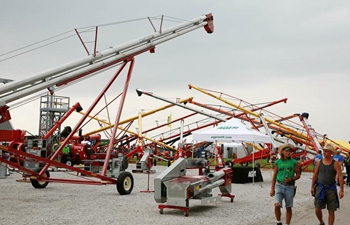NANJING, Aug. 30 (Xinhua) -- Yang Lifeng, a 30-year-old foreman in a mechanical processing workshop in the city of Suzhou, east China's Jiangsu Province, is worshipped by his fellow migrant workers, as he foresaw the trend of robot invasion in factories five years ago.
The native from northern China's Hebei Province arrived in Suzhou and heard Foxconn, the world's largest electronics contract manufacturer, cut thousands of jobs in the city to replace them with robots.
Aware of the threat, Yang, with a junior college degree, started to take computer numerical control (CNC) lessons at his own expense, while working a factory job in the Suzhou Tianze Precision Machinery Co. Ltd.
The factory began to introduce automation equipment in 2015, reducing the number of workers to 100 from 500.
Yang's foresight to learn CNC not only saved him from being laid off but also provided him with the opportunity to become a mechanic foreman in the Jiangsu factory, the largest manufacturing province in east China.
Earning a higher salary than his fellow laborers, Yang bought an apartment in the city last year and settled down like a local, a dream of many struggling migrant workers in China.
Industrial robots are rapidly gaining on human workers in economic powerhouses in China's eastern and southern regions.
As labor costs rise, industrial employers have become more and more interested in the efficiency of robots.
According to the International Federation of Robotics, China installed around 138,000 industrial robots last year, accounting for one-third of the global market and representing a 58-percent growth rate year on year. The robot sales are expected to reach 150,000 units in 2018.
"There is only one way that you don't lose your jobs to robots -- control them," Yang often lectured his fellow workers, calling on them to acquire more skills.
Yang is not the only one with such forward thinking. China's new generation of migrant workers born after 1980 has become mainstream in the workforce.
In 2017, the number of young, rural-urban migrants reached 145 million, surpassing 50 percent of the total migrant workforce for the first time, according to the National Bureau of Statistics (NBS).
However, the NBS statistics also showed that 48 percent of the young migrant workers are employed in the service industry, an increase of 1.3 percent, while in manufacturing and construction industries, employment rates are down by 0.6 and 0.8 percent respectively. A labor shortage prevails in the manufacturing and construction sectors.
"Compared with the older generations, young migrant workers have more job choices, especially in the booming service sector," said Zhu Tianshu, director of the Kunshan Human Resources and Social Security Bureau in Suzhou.
He said local factories are in need of technicians and engineers. These jobs are largely for the younger generation.
Statistics from NBS showed that in 2017, 10.3 percent of the country's migrant workers had a college education, up 0.9 percent from the previous year.
Zou Nongjian, a professor at Nanjing Normal University, said more and more technical colleges in China are working with companies in curriculum creation and talent training so that graduates can have better chances to enter companies for internship experience and gain practical skills.
"People with better skills find better jobs in cities," said Li Xing, 26, working in the German-invested Bosch Automotive Products (Suzhou) Co. Ltd.
Li said since the company introduced robots into the workshops three years ago, it has also set up a training center where workers can take training courses in machinery, electronics and engineering to become robot operators.
"The company encouraged us to grasp more skills. During training, my work hours were reduced, but my salary increased," said Li, who has become one of the company's 6,000 robot operators.
He still wants to improve and is working on a technician certification test. Once passed, the certificate could add value to his career development. He aims to be a workshop foreman in five years.

















